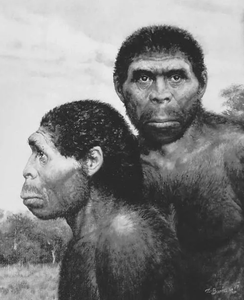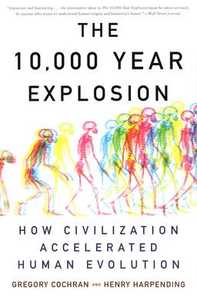**Background on evolution by punctuated equilibrium**
Evolution operates via punctuated equilibrium. Most species change only slowly, most of the time, because they are well-adapted to the ecological niche they occupy. A tiger is a perfect tiger. Deviating from the plan in any direction makes it worse at tigering and less likely to survive.
Occasionally, some change in the ecosystem punctuates the equilibrium, causing a period of rapid change. At any given moment, there are a few branch-tips of the tree of life undergoing such a punctuation, usually coinciding with speciation events where new species or subspecies come into existence.
The classic example are the Galapagos finches; a few finches from mainland South America were windblown far offshore, landing in an alien environment, where they rapidly changed to occupy niches quite different from those of their ancestors.
What's important to understand is that the pace change is extreme. In equilibrium, evolution is a *correction mechanism*, discarding almost all of the variation and random errors generated by genetic reproduction to maintain the exact same phenotype over tens of millions of years (for the horseshoe crab, 400 million and counting). Rate of change = 0. Meanwhile under consistent selection pressures in a particular direction, you can go from a grey wolf to a french bulldog in a few hundred years. Rate of change = massive.
**What this means for human evolution.**
Humans are the result of a recent punctuation. The broad story is familiar--our distant chimp-like ancestors gained evolutionary advantage from intelligence (possibly because of primitive tool use), triggering a runaway period of evolution toward larger brains, more sophisticated tools, tribal organization and eventually spoken language.
We expanded across the world to occupy new niches as a new kind of meta-organism that had never existed before: small tribes (generally below Dunbar's number of ~150) sharing basic language, culture, and technology. There's interesting scholarship on the ways this impacted our evolution, such as this paper by David Sun.
https://psycnet.apa.org/fulltext/2025-88410-001.htmlThe fascinating follow-up question that's taboo to study: which new selection pressures (and more pointedly, what additional evolution) occurred *after the advent of civilization*? Obviously the invention of writing, agriculture, and cities changed the niche we occupy & changed the fitness landscape of which people survive and reproduce. This is far more recent--roughly 10k years ago (while language-speaking, fire-cooking, hunter-gathering tribes existed for 50k+ years before that in much of the world).
The standard dismissal is that evolution "occurs over millions of years", etc. But we've already seen that the pace of evolution covers a wide range and can happen much faster.
The effects of civilization on human genetics have not been mapped in detail, but we have the tools to do so now. I predict that within the next decade we'll have concrete evidence of civilization-caused human evolution. The research will likely be presented euphemistically or in a way that focuses on less-taboo aspects of this evolution (eg. things like digestion & genetic adaptation to agricultural diets), but the full range likely includes cognitive abilities and emotional traits including impulse control, time preference, and more.


